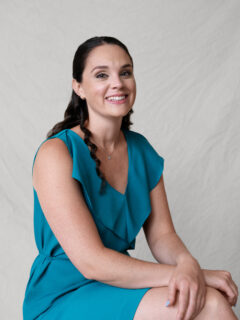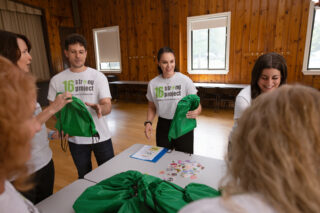
Samantha Wettje is the co-founder of 16 Strong Project, an organization dedicated to helping children, teens and young adults affected by adverse childhood experiences.
The CDC defines ACEs as “potentially traumatic events that occur in childhood.”
“Growing up, there was mental illness and addiction with family members that really impacted our family, so that was something that I saw in middle school and high school, and I didn’t really know much about it,” she said.
Wettje felt alone and didn’t know that others shared her experiences.
“No one really thought to check on me because from the outside, I was someone who did really well in my classes,” she shared. “My life during those teenage years lacked a lot of stability.”
The idea of starting a non-profit organization wasn’t always on her radar.
When she graduated high school, her main goal was to study financial economics and get a “good stable job.”
Although she reached it, within a few years post-college, she craved to make a bigger impact.
She decided to search for organizations to join that related to what she experienced.
“There was a lot talking about mental health in general, treatment and support groups, which is amazing, but there wasn’t as much with helping support children who had family members that were dealing with that stuff and not necessarily themselves,” she said.
She thought, why not start one herself?
She and her mom, Donna Wettje, joined forces and started to brainstorm.
While the idea was in the works, Samantha decided to pursue her master’s degree at Harvard Graduate School of Education.
It was here that she was first introduced to the term ACEs.
“That moment was when a light bulb really went off in my head both personally and through all this work we were doing,” she said. “Personally, I found a term to describe what I went through as a kid. At that point, I could finally say, ‘Oh, I had adverse childhood experiences.’ That’s what I was feeling when I was feeling alone and feeling a lot of blame.”
A weight lifted off her shoulders.
The 16 Strong Project launched their first pilot program in the fall of 2019 at Clarkstown South High School and Clarkstown North High School.
“We teach young people directly about ACEs: how to recognize it and have language to describe it,” she said.
Because it was launched just a few months before COVID, the openness of connecting online really allowed them to expand at a national scale.
In 2020, they introduced the Youth Advocacy Board, which allows those 14-24 to have a voice in the creation of mental health resources and solutions.
In this leadership position, “YAB members go through a training and are supported in advocacy projects of their choosing in their own schools and/or communities.”

Another program that the organization offers is T.I.P.S. (Trauma-Inforced-Practice-and-Solutions), which is specifically designed for school personnel and faculty “to provide strategies and tools to strengthen their response to the emotional needs of their students.”
Samantha considers every child, teen and young adult who was in school during the pandemic as a survivor of an ACE.
“Meet them where they’re at. Understand what their challenges are, really listen. What we hear the most from young people is that adults aren’t listening to them,” she said. “They feel like they kind of brush it off and say ‘Oh, you’re just a teenager. It’s hormonal’ or things like that.”
Oftentimes, adults may try to outweigh the child, teen, or young adult’s circumstance with a comparative positive statement that begins with “At least you’re…”.
“While it may seem helpful to point out the positives, I think it’s very important, it doesn’t negate the adverse things that are going on either,” Samantha said.
To learn more about 16 Strong’s programs and how you can get involved, be sure to check out their website at www.16strongproject.com.
Be sure to follow @cait_malilay_writes for future articles.
You can also email her at type.away.cait@gmail.com for news tips or stories.

You must be logged in to post a comment Login